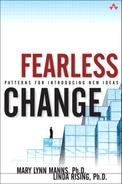The Right Time
It’s good to request the last or second-to-last interview slot of the day, since these are the time slots that are the most memorable for the interviewer. If you want to be remembered, make your appointment as late in the day as possible.
Consider the timing when you schedule events or when you ask others for help.
![]()
You are an Evangelist(144) or Dedicated Champion(129) trying to introduce a new idea into an organization.
When people face deadlines and have too much to do, they tend to focus on things that move them toward completing necessary tasks and making the deadlines.
People are busy. However, there are less busy times.
When you’re really excited about a new idea, you want to tell everyone immediately. But you should temper your enthusiasm with the realization that by springing your news at an inconvenient time, you risk irritating members of your target audience and losing converts to your cause.
Timing is also crucial when approaching someone to Ask for Help(104). If people are busy, they could react as if you’re trying to add one more thing to their busy schedules. But if your request comes when they’re less busy, they are likely to be more responsive.
Therefore:
Be aware of those times when people are likely to be the busiest. Schedule events and requests for help outside those times.
Some suggestions for less busy times: immediately after a project has been delivered, at the beginning of a new year, or possibly during the summer. The best timing will vary from organization to organization, group to group, and person to person. What is good for one will not be good for another. Avoid planning events when almost everyone is too busy to attend.
If you’re able, personally ask as many individuals as you can about their time preferences for an upcoming event. This will make them feel that you would really like them to be present.
Don’t worry about finding the perfect time. You can spend a lot of effort trying to find the best time when there really isn’t one. One approach is to schedule the event more than once. Choose different days or times so more people can attend.
Announce dates as early as possible and send out reminders on the e-Forum(135) and In Your Space(167). Busy people need lead time and reminders. Personally remind individuals when you have the opportunity.
Elicit feedback. Ask attendees at any event what could have been done to improve the event—and this includes timing. You might learn that some people, for example, would like an early morning event, while others prefer a noontime Brown Bag(113) or a late afternoon meeting at the end of the day.
You don’t have to consider the timing in planning every event. For example, Study Groups(228) are usually held on a regular basis and it is expected that people will come when they can. Big Jolt(107) presentations have to be held at the convenience of the speaker.
Be sensitive of timing during meetings or conversations. “When the student is ready, the teacher appears” is a big part of this pattern. Keep your ears open for a problem that the new idea can help to address. The receptiveness of your group will increase considerably at a time when they have an immediate application.
= = = = = = = = =
This pattern creates more appropriate timing for introducing the new idea. If you can find a good time, you are likely to increase participation.
But, despite your efforts, some people will claim to be too busy to do or attend anything that doesn’t directly relate to their immediate job. Use Personal Touch(198) to reach them. Encourage them to hear a one-time Big Jolt(107) speaker.
Ian tried to be aware of the needs of many different people while he waited for the opportunity to help someone with a problem. It doesn’t help a team to talk about testing patterns during design or to talk about configuration management patterns during analysis. When the solution fits the needs, the timing is right and people will be ready to listen.
Nilesh held the first workshop about a new idea during the start of a semester. The second one was held at the end of the semester, just after grades were due. Both events were well attended. Attendees were excited about continuing the workshops. But when the third event was scheduled during the fourth week of the semester, just as the workload was heating up, it had to be cancelled due to lack of positive responses.
